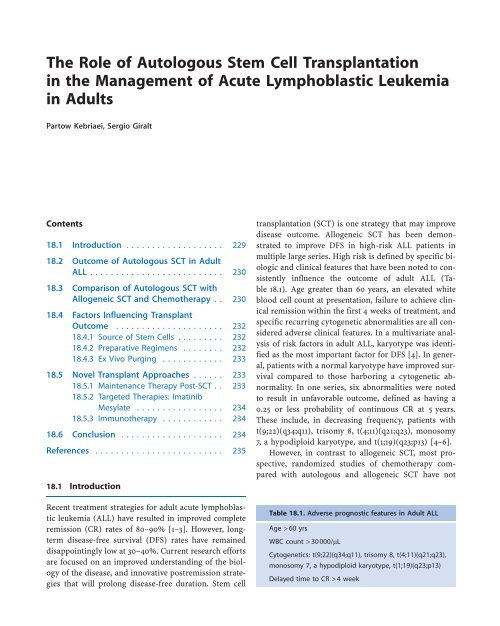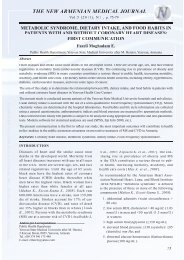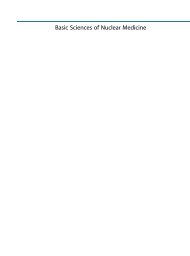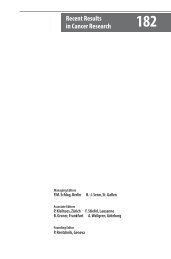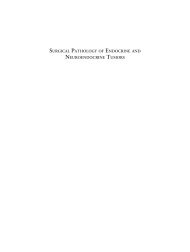Acute Leukemias - Republican Scientific Medical Library
Acute Leukemias - Republican Scientific Medical Library
Acute Leukemias - Republican Scientific Medical Library
Create successful ePaper yourself
Turn your PDF publications into a flip-book with our unique Google optimized e-Paper software.
The Role of Autologous Stem Cell Transplantation<br />
in the Management of <strong>Acute</strong> Lymphoblastic Leukemia<br />
in Adults<br />
Partow Kebriaei, Sergio Giralt<br />
Contents<br />
18.1 Introduction ................... 229<br />
18.2 Outcome of Autologous SCT in Adult<br />
ALL .......................... 230<br />
18.3 Comparison of Autologous SCT with<br />
Allogeneic SCT and Chemotherapy . . 230<br />
18.4 Factors Influencing Transplant<br />
Outcome ..................... 232<br />
18.4.1 Source of Stem Cells ......... 232<br />
18.4.2 Preparative Regimens ........ 232<br />
18.4.3 Ex Vivo Purging ............ 233<br />
18.5 Novel Transplant Approaches ...... 233<br />
18.5.1 Maintenance Therapy Post-SCT . . 233<br />
18.5.2 Targeted Therapies: Imatinib<br />
Mesylate ................. 234<br />
18.5.3 Immunotherapy ............ 234<br />
18.6 Conclusion .................... 234<br />
References ......................... 235<br />
18.1 Introduction<br />
Recent treatment strategies for adult acute lymphoblastic<br />
leukemia (ALL) have resulted in improved complete<br />
remission (CR) rates of 80–90% [1–3]. However, longterm<br />
disease-free survival (DFS) rates have remained<br />
disappointingly low at 30–40%. Current research efforts<br />
are focused on an improved understanding of the biology<br />
of the disease, and innovative postremission strategies<br />
that will prolong disease-free duration. Stem cell<br />
transplantation (SCT) is one strategy that may improve<br />
disease outcome. Allogeneic SCT has been demonstrated<br />
to improve DFS in high-risk ALL patients in<br />
multiple large series. High risk is defined by specific biologic<br />
and clinical features that have been noted to consistently<br />
influence the outcome of adult ALL (Table<br />
18.1). Age greater than 60 years, an elevated white<br />
blood cell count at presentation, failure to achieve clinical<br />
remission within the first 4 weeks of treatment, and<br />
specific recurring cytogenetic abnormalities are all considered<br />
adverse clinical features. In a multivariate analysis<br />
of risk factors in adult ALL, karyotype was identified<br />
as the most important factor for DFS [4]. In general,<br />
patients with a normal karyotype have improved survival<br />
compared to those harboring a cytogenetic abnormality.<br />
In one series, six abnormalities were noted<br />
to result in unfavorable outcome, defined as having a<br />
0.25 or less probability of continuous CR at 5 years.<br />
These include, in decreasing frequency, patients with<br />
t(9;22)(q34;q11), trisomy 8, t(4;11)(q21;q23), monosomy<br />
7, a hypodiploid karyotype, and t(1;19)(q23;p13) [4–6].<br />
However, in contrast to allogeneic SCT, most prospective,<br />
randomized studies of chemotherapy compared<br />
with autologous and allogeneic SCT have not<br />
Table 18.1. Adverse prognostic features in Adult ALL<br />
Age >60 yrs<br />
WBC count >30000/lL<br />
Cytogenetics: t(9;22)(q34;q11), trisomy 8, t(4;11)(q21;q23),<br />
monosomy 7, a hypodiploid karyotype, t(1;19)(q23;p13)<br />
Delayed time to CR >4 week


